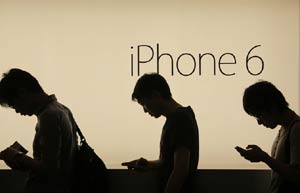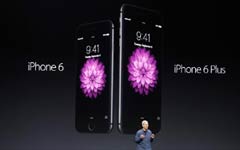IPhone 6 sets records, but problems quickly emerge
(Bloomberg) Updated: 2014-09-26 07:32Yet while Cook deals with consumer criticism over his handling of the iPhone rollout, the issues may have little impact on Apple's sales. Demand for the new handsets has the company poised to sell more than 61 million iPhones in the December quarter, surpassing last year's record 51 million sold, according to Barclays.
Sales are also set to pick up-not decelerate-as the new iPhones become available in more countries. On Sept 19, the first day the handsets went on sale in stores, Apple rolled them out in 10 countries. The company is set to introduce the gadgets in another 22 countries on Friday. In total, the iPhones will be in 115 countries by the end of the year, Apple has said.
 |
 |
Apple shares are up 27 percent this year.
Still, some consumers are thinking twice about buying the devices in the wake of Wednesday's snafus. After having problems with Apple's new software upgrade to his old iPhone, James Zahrt, a customer since 1989, decided to put off a new smartphone purchase.
"I was going to order one immediately but now I'm going to wait," said Zahrt, 58, of Mt Prospect, Illinois, who has had troubles with his iPhone 4s' alarm clock working properly since downloading Apple's iOS 8 software last week. "I think the bugs need to be worked out on this thing."
The popular tide turned against the new iPhone 6 and 6 Plus earlier this week when reports began emerging that the 5.5-inch screen larger model was bending when people sat on it. Rivals including BlackBerry Inc Chief Executive Officer John Chen took a jab at the iPhone on Wednesday, saying he "would challenge you guys to bend our Passport" device.
That was followed by reports from users on Wednesday that the iOS 8 software upgrade, which had been issued to address previous software bugs and add the health and fitness-monitoring application HealthKit, was causing some customers to experience dropped cell service.
Frustrations about iOS 8 had been mounting even before Wednesday, with user complaints that their devices' battery life seemed to have dwindled after downloading the software, along with data showing applications were more likely to crash with the operating system. According to Crittercism Inc, an analytics firm, iOS 8 causes apps to crash about 3.3 percent of the time, or 67 percent more than last year's version.
While glitches are not unusual for software updates, Apple attracts more attention, said Frank Gillett, an analyst at Forrester Research.
"Apple is a bit of lightning rod or a focus because as a company, they inspire a lot of positive and negative passion and also because they are now this company with a global brand and global reach," he said.
- Highlights from the China Internet Security Conference 2014
- Chinese home buyers boost Australian property market
- China struggling to meet demand for cotton
- Tesla Motors expands its Hong Kong operation
- BOC predicts China Q3 growth at 7.3%
- Chinese officials upbeat on economic growth
- Navistar, China's JAC diesel engine JV project put into operation
- Tianjin Maritime Court of People's Republic of China

















